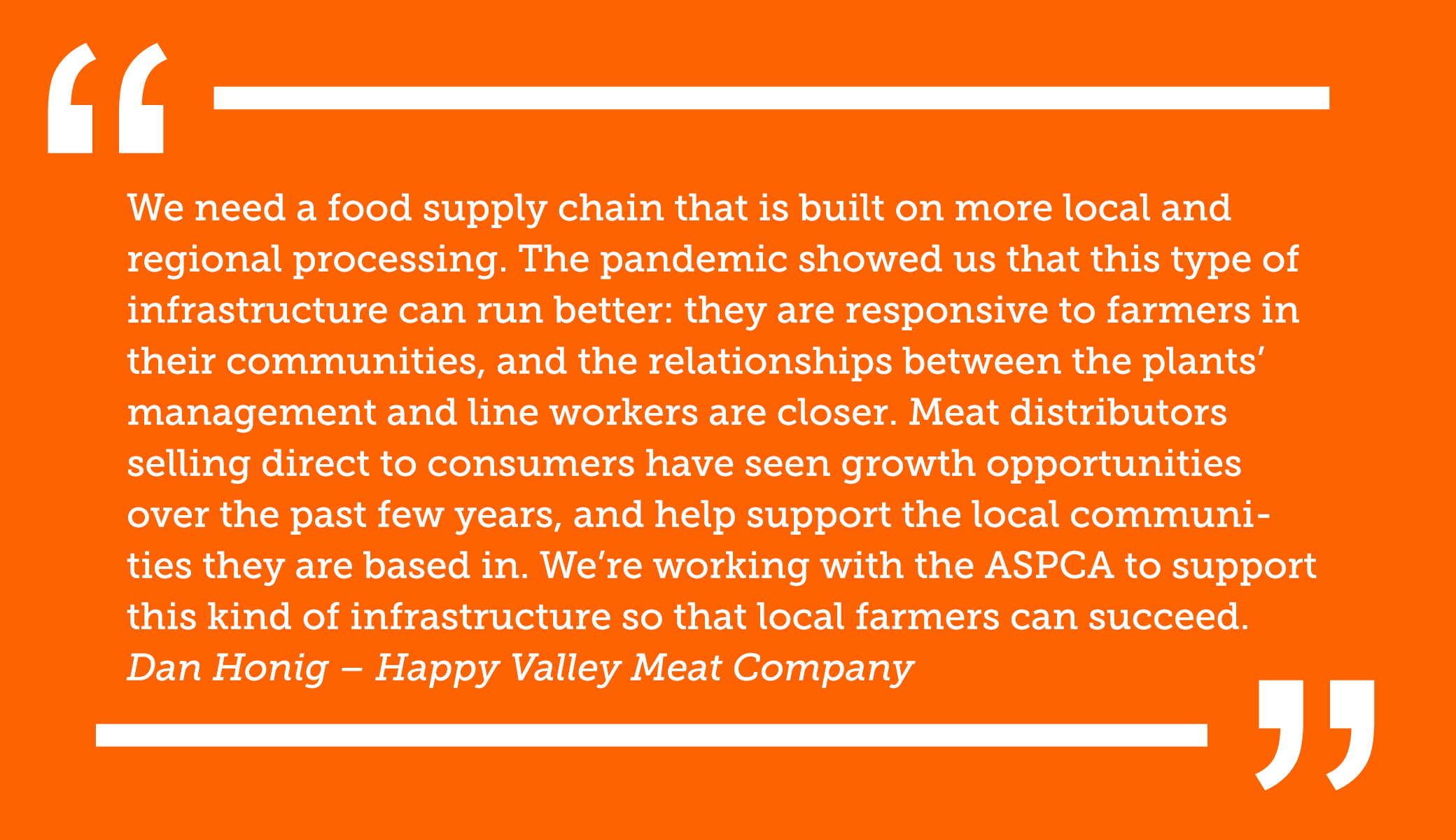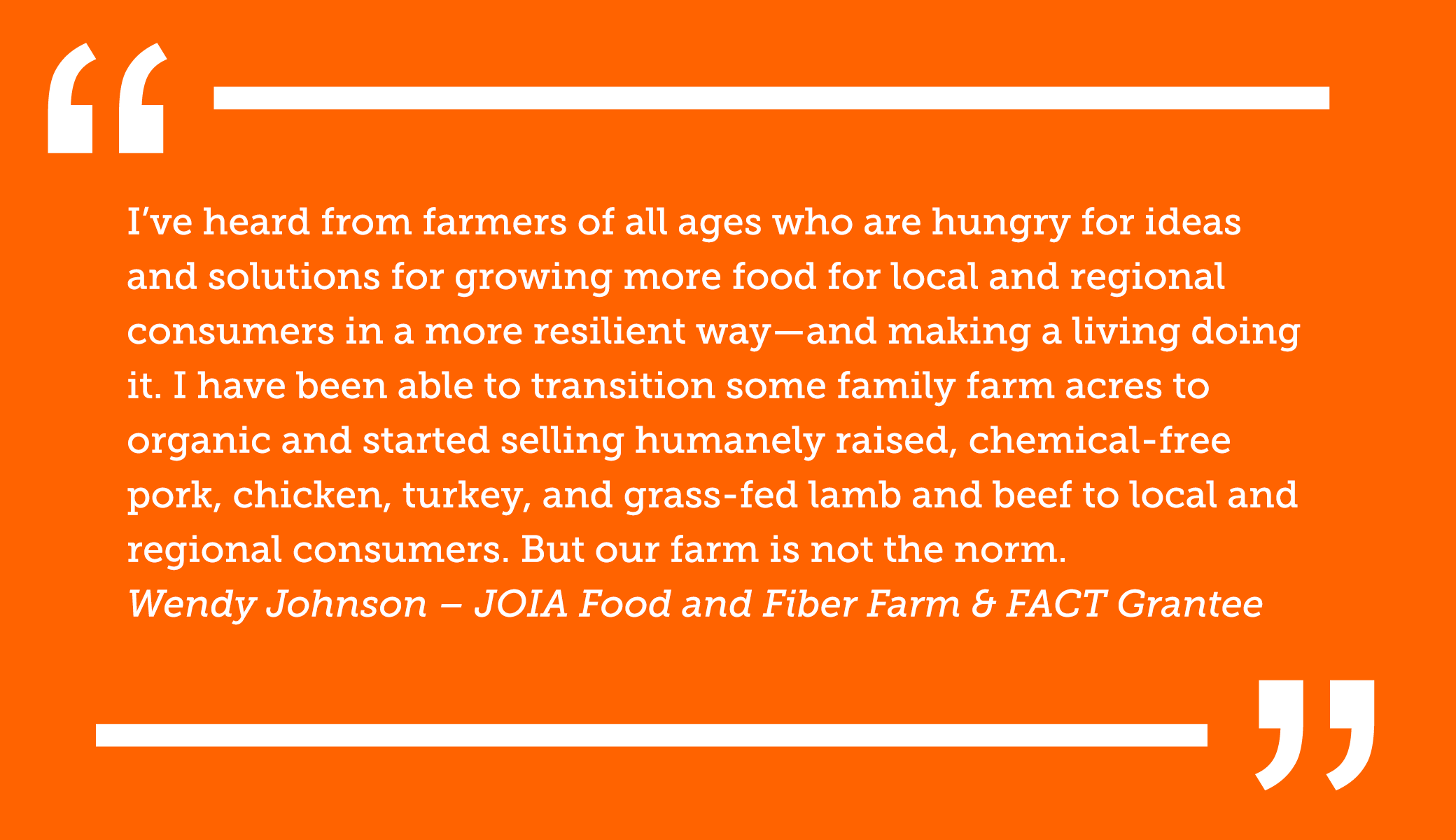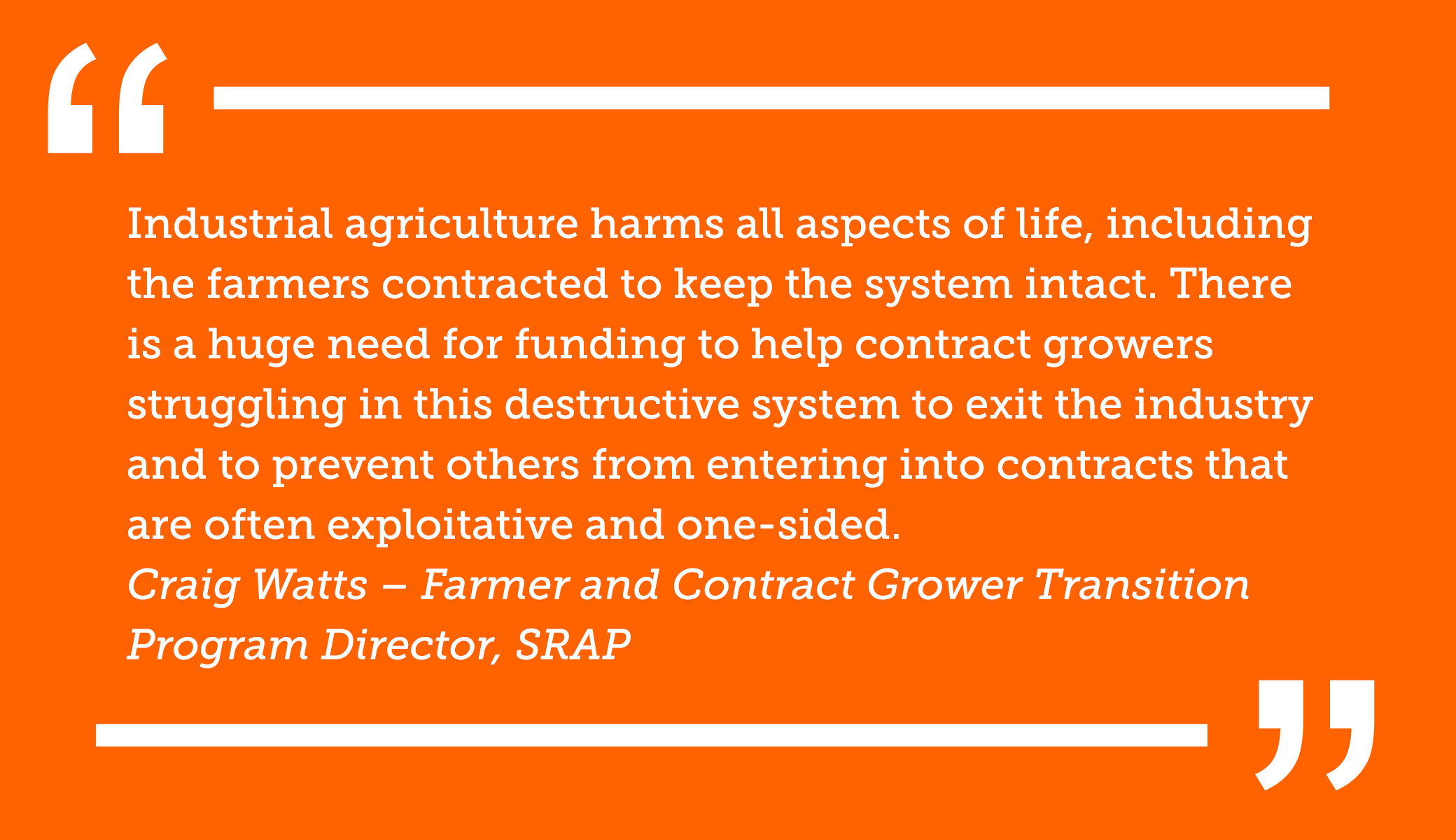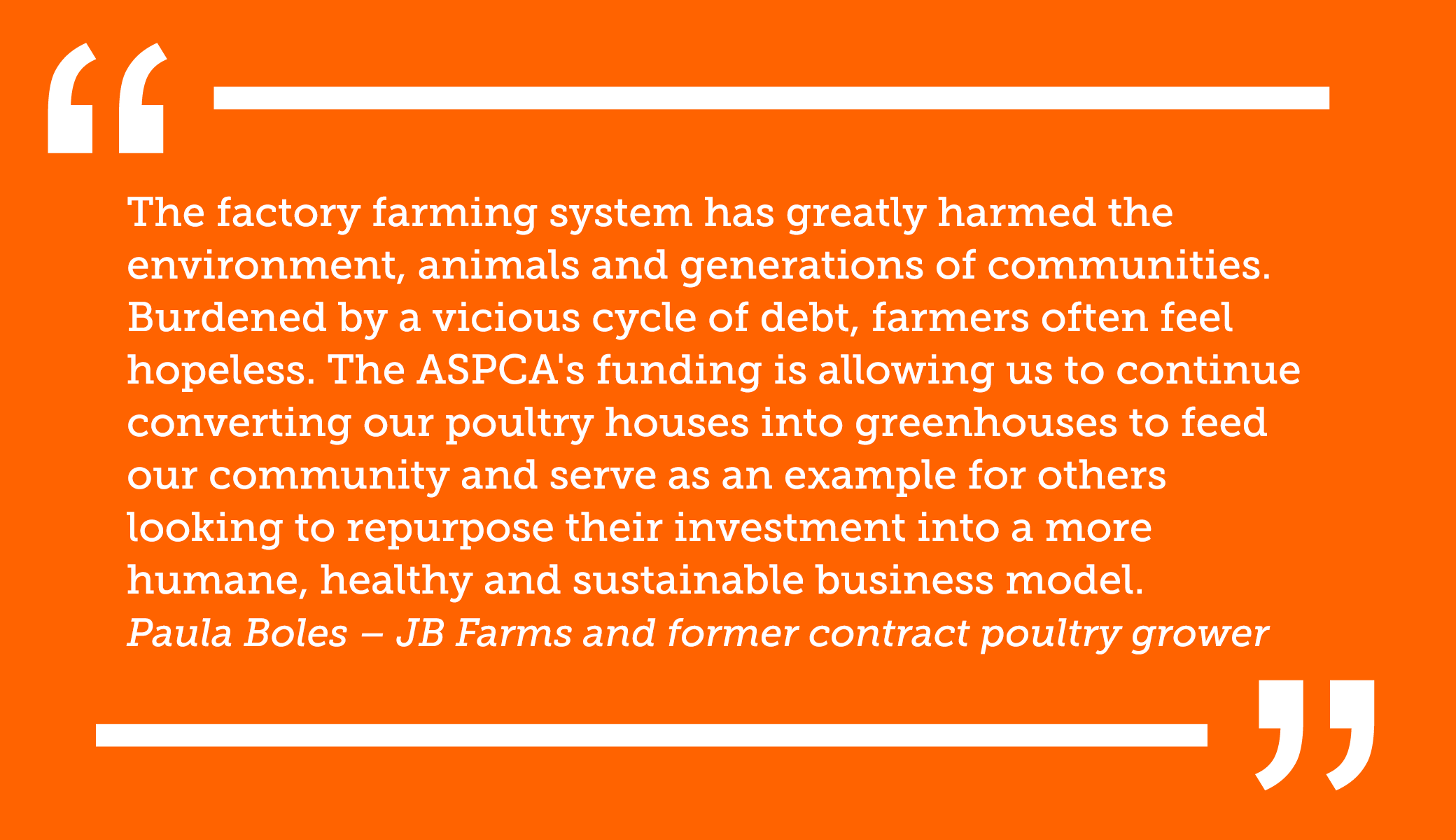Every day the ASPCA works with and supports farmers and food companies that share our vision of a more humane food system that treats animals, people, communities and the environment with respect.
America's current food system is dominated by confinement-based, industrial animal agriculture. Unfortunately, corporate consolidation along with federal and state policies make it difficult for farmers who prioritize animal welfare to succeed in the marketplace. Government permissiveness regarding misleading food labeling, subsidies that prop up industrial practices, and a lack of resources available to farmers engaged in more resilient, humane forms of agriculture are all major barriers we are working to remove.
The ASPCA is dedicated to tackling the systemic disadvantages that higher-welfare farmers face because we believe that when welfare-centered farmers thrive, animals benefit, as do the millions of consumers who are searching for more humane alternatives to factory farmed food.

What will level the playing field for higher-welfare farmers and support their growth? Farmers tell us three things will make a big difference, so we are working hand-in-hand with them to drive these changes:
Increased investment in more humane farmers and farming systems
For decades, federal and state policy has been used as a tool to prop up the harmful factory farm system, providing billions of dollars in subsidies and funding that directly benefit industrial animal agriculture, leaving more humane and responsible farmers at a severe disadvantage in the marketplace. Through grantmaking, public policy work and farmer engagement, the ASPCA is helping farmers obtain financial resources to adopt practices that improve their animals' welfare and allows them to access new markets.
Much of the existing state and federal grant funding is funneled to large agribusiness, leaving small and mid-sized farmers without much-needed resources to support their higher-welfare operations. There is a critical need to invest in farmers who want to raise animals on pasture, grow diverse crops, and implement the hundreds of other conservation practices proven to benefit animals and our environment, as well as to support the infrastructure that allows for a more humane and diversified food system. To respond to this need, the ASPCA partners with the Food Animal Concerns Trust (FACT) to partially fund their "Fund-a-Farmer" grants. These grants are available for farmers who want to obtain or who already hold a meaningful animal welfare certification, as well as to farmers who are improving their animals' access to pasture. The ASPCA continues to prioritize funding and underwriting farmers’ efforts because the need continues to grow.
Farmers looking to get out of the industrial system also face significant financial barriers, often struggling just to pay off the original debt they took on to begin raising animals for large agribusiness companies, let alone take on new expenses to transition their operations to higher-welfare production or crops. Traditional funding streams like agricultural lenders generally overlook transition projects, where farmers and ranchers need investment to improve welfare or environmental practices. Instead, lenders funnel millions of dollars into maintaining and building factory farms. To make up for this lack of funding, the ASPCA has underwritten over one million dollars in grants to individual farmers transitioning out of the inhumane, unsustainable factory farm system as well as to organizations helping farmers transition.
To fully scale up higher-welfare farming systems, displace factory farming and make a meaningful impact for farm animals, the ASPCA is working with farmers and a broad coalition of organizations to:
- Pass a more humane Farm Bill that directs government funding toward building robust local and regional food systems that supply higher-welfare animal products to meet growing demand.
- Pass the Farm System Reform Act to establish a $100 billion voluntary buyout program for contract farmers who wish to transition from the factory farm system to more sustainable and humane practices.
- Create state or federal policies that would convey tax incentives for farmers making on-farm changes to improve animal welfare and achieve meaningful animal welfare certifications, such as those found in the Food and Farm Act.
- Create state-level funding programs to support higher-welfare farmers. Vermont answered the call in 2019 by passing legislation (S.160) to ensure that Vermont farms and businesses looking to meet animal welfare certification standards or expand the capacity of their welfare-certified businesses have access to state grant funding. Similarly, we are leading the charge in California to create a Resilient Farms and Ranches Grant Program to help farmers and ranchers adopt more humane and holistic standards of care and to support farmers transitioning to more climate-friendly practices, including raising animals on pasture.
We provide technical resources to help farmers and companies adopt meaningful and transparent animal welfare policies and practices. To aid both farmers and businesses, we created a Farm Animal Welfare Certification Guide. The guide covers the three certification programs that the ASPCA recommends, all of which represent a spectrum of higher-welfare ways to raise farm animals: Animal Welfare Approved, Certified Humane® and Global Animal Partnership (Steps 2 and above). The Farm Animal Welfare Certification Guide contains:
- Evidence that the market for welfare-certified products is growing
- A comparison of key differences among the three programs
- Step-by-step breakdowns of each certification process
- In-depth case studies from each certification program
- An explanation of funding options available to farmers interested in certification

Improved oversight and accountability for industrial agriculture
There are four companies that control 85% of cattle slaughter, 70% of pork production and 54% of the poultry products on the market. As a result of this corporate consolidation pushing farmers to “get big or get out,” the nation has lost more than 100,000 farms over the past decade. The largest companies dominate so much of the market that they are able to dictate farmers’ practices and pricing. This outsized influence also allows giant agribusiness companies to skirt accountability for the harm their system causes to animals, the environment, farmers and workers. The ASPCA is working to increase oversight and accountability of industrial agriculture through our grantmaking and public policy priorities.
Manipulation of the marketplace and the use of exploitative contracts can leave farmers feeling like there is no way out of the industrial animal agriculture model. That’s why, in addition to supporting independent higher-welfare farms and ranches with grants, the ASPCA has underwritten grants for the Socially Responsible Agriculture Project’s (SRAP) Contract Grower Transition Program. With support from the ASPCA, SRAP’s Contract Grower Transition Program can help farmers escape industrial animal agriculture while equipping them to advocate for socially responsible farming systems that prioritize public health, the environment and animal welfare.
The ASPCA is working with farmers and a broad coalition of organizations to address the control that industrial agriculture has over the U.S. farm system which perpetuates animal abuse and prevents higher welfare farming from thriving. We do this by:
- Supporting the federal Farm System Reform Act to establish a moratorium on new CAFO (Concentrated Animal Feeding Operation) development and phase out existing large factory farms by 2040.
- Supporting state-level CAFO moratorium efforts and prohibitions on extreme confinement of farm animals in cages and crates.
- Supporting the federal Industrial Agriculture Accountability Act to ensure that industrial operators aren’t using the worst depopulation and slaughter practices, including dangerous line-speed increases and meatpacker self-inspection programs, while also protecting billions of farmed animals by passing new requirements for more humane transport and slaughter, including phasing out cruel live-shackling of chickens and turkeys.
- Working to pass a more humane Farm Bill that reforms Commodity Checkoff Programs that spend hard-earned farmer dollars to lobby Congress against the interests of the farmers they claim to represent.
- Strengthening the Packers and Stockyards Act in order to promote sector competition and protect family farmers and ranchers from monopolistic practices.
- Fighting ag-gag laws designed to protect and hide the activities of industrial-scale farms at the expense of higher welfare farmers and rural communities.
- Opposing so-called “Right-to-Farm" laws that preserve the status quo and protect the interests of industrial agriculture over those of animals, small farmers, local communities and the environment.

More transparent and fair marketplaces that support higher-welfare farmers
Farmers who center the welfare of animals in their business model unfortunately have the odds stacked against them, competing with industrial agriculture’s artificially deflated prices and navigating a supply chain that is not built for their needs. Infrastructure that brings products to market caters to industrial agriculture, with only a handful of slaughter or distribution facilities available for small and mid-sized producers. Many higher-welfare farmers report having to schedule slaughter appointments more than a year in advance. These market disadvantages are worsened by the proliferation of misleading animal welfare claims, made possible by inadequate regulation of labels by the U.S. Department of Agriculture. Well-intentioned consumers looking to support higher-welfare farmers are often deceived into purchasing products bearing meaningless claims like “natural” or “humanely raised.” The ASPCA is working to create more transparent and fair marketplaces through our public policy priorities and consumer education programs.
To reform food and farm supply chains and create a fair and more transparent marketplace, the ASPCA is working with farmers and a broad coalition of organizations on:
- Labeling reform: We need to create new food labeling guidelines with strong verification requirements. This will benefit farmers who raise animals more humanely, ensure animal welfare claims paint a more truthful picture for shoppers and support efforts to provide farmed animals with better lives.
- Local and regional food systems: To ensure more funding is building out local and regional supply chains, the ASPCA is a national partner to the Good Food Purchasing Program (GFPP)—a food procurement tool that helps school systems, municipalities and other public entities source food that meets five value criteria:
- Animal welfare
- Nutrition
- Support for local economies
- Worker justice and safety
- Environmental sustainability
- Small and mid-sized processing: The immense power of a handful of giant meatpackers traps non-industrial farmers in an unfair marketplace. The ASPCA supports efforts to expand the capacity of small and mid-sized meat and poultry processors and provide them with funding to implement more humane slaughter technologies. Boosting the small and mid-sized plants will give farmers a more competitive marketplace and help support thriving local and regional food systems by investing in processing capacity closer to their farms while also alleviating bottlenecks in food and agricultural supply chains.
The ASPCA launched the Shop With Your Heart program in 2016 to help build a more humane food system by closing the gap between consumers’ demand for higher-welfare products and their ability to identify these products in the market. Shop With Your Heart recognizes over 250 individual farms and ranches across the U.S. that have achieved a meaningful animal welfare certification, as well as meat, egg, and dairy brands that source from higher-welfare farms. Collaboration with farmers, food businesses, and third-party certification programs have been essential to the program’s success.
Recognizing that 89% of consumers are genuinely concerned about the effects of industrial animal agriculture, the Shop With Your Heart program includes resources that activate and empower consumers to better navigate the marketplace and connect with higher-welfare farms and farmers. The program’s resources are reaching a growing audience—over one million users visit Shop With Your Heart resources every year—and the ASPCA’s broad base of animal-loving supporters are exposed to the resources each month. Based on surveys, the program has led to 80% of users reporting a change in what they buy or how they shop for food.

If you are a farmer or rancher, we want to hear how we can help you overcome challenges you’re facing in the marketplace, on the farm or at the policy level. If you have ideas for how we can support the movement toward a more humane food system, please reach out to us at [email protected].
Together, we can make the system work better for animals and welfare-centered farmers.

